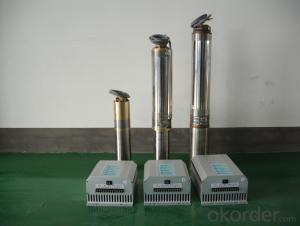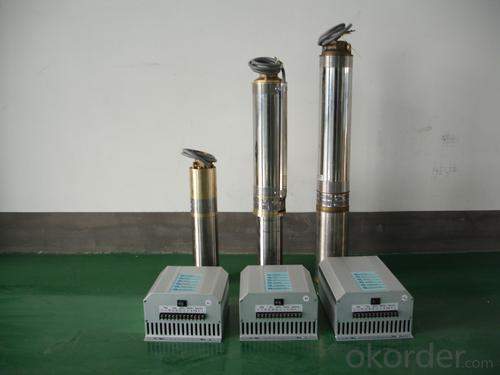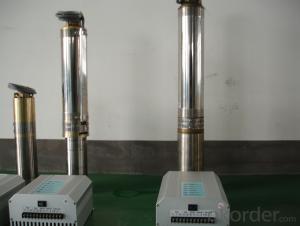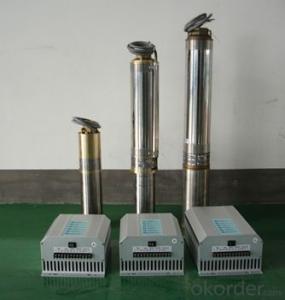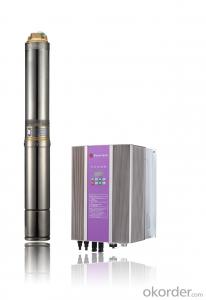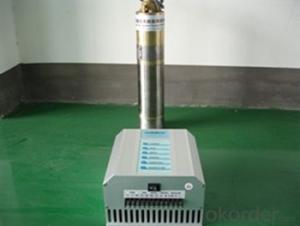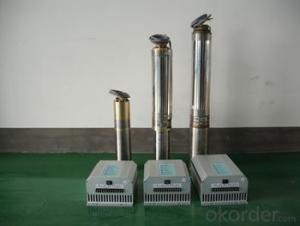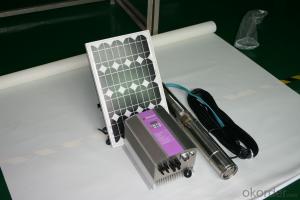Grundfos Solar Pump (DC)
- Loading Port:
- China Main Port
- Payment Terms:
- TT OR LC
- Min Order Qty:
- -
- Supply Capability:
- -
OKorder Service Pledge
OKorder Financial Service
You Might Also Like
Item Description :
This superb new addition to our solar fountain range comes with a 10w solar panel,and a powerful fountain pump that is capable of producing fountains of up to 2m in height. As well as being easy to set up and use.Instruction manual is supplied for assembly and maintenance.
Solar Fountain Key Features :
Powered by direct sunlight
No high voltage electric mains required
Safe for children
Max. height of fountain: 2M
Max. flow capacity: 800 L/H(176 GAL)
10W Polycrystalline solar panel included
18V DC brushless pump
Solar Pump Features :
Can produce fountains up to : 2M (tube height) 1.4M (fountain height)
Comes with multiple nozzle accessories
Cable Length : 5M
Solar Panel Features :
10W peak power.
Polycrystalline highly efficient solar panel
Comes mounted in aluminium frame
Comes with ground stake and rotating knob so you can angle your panel toward the sun
What You Will Get :
10W solar panel
Solar pump
Ground Sake
Nozzle accessories
Precautions :
DO NOT alter or change the product itself or its components
Operate pump in freshwater only, never above 50 degrees celsius
Keep away from flammable liquids
Do not connect to any other power supply other than the included
- Q: Can a solar pump be used in areas with high levels of nitrites in the water?
- Yes, a solar pump can be used in areas with high levels of nitrites in the water. The function of a solar pump is to move water, and it does not directly affect the quality or composition of the water. However, it is important to note that a solar pump will not remove or reduce nitrites from the water. Therefore, appropriate water treatment methods should be employed to address the high nitrite levels before utilizing the solar pump.
- Q: Are there any government incentives or subsidies for installing a solar pump?
- Yes, there are government incentives and subsidies available for installing a solar pump. Many governments around the world recognize the importance of renewable energy and the benefits of utilizing solar power for water pumping systems. These incentives and subsidies aim to encourage individuals, businesses, and organizations to adopt solar pumps as an environmentally friendly and sustainable alternative to traditional pumping systems. The specific incentives and subsidies available may vary by country or region, but they typically include financial assistance, tax credits, grants, and low-interest loans. For example, in the United States, the federal government offers a federal investment tax credit (ITC) that allows individuals and businesses to deduct a percentage of the cost of installing a solar pump from their federal taxes. Some states may offer additional incentives on top of the federal ITC. Furthermore, various international organizations, such as the World Bank, also provide funding and support for solar pump installations in developing countries. These initiatives aim to improve access to clean water and enhance agricultural productivity in areas where electricity supply is unreliable or non-existent. It is advisable to consult with local government agencies, energy departments, or renewable energy associations to get detailed information about the specific incentives and subsidies available in your area. By taking advantage of these government programs, individuals and businesses can significantly reduce the upfront costs of installing a solar pump and contribute to the transition towards a more sustainable future.
- Q: Can a solar pump be used for fish farming or aquaculture?
- Yes, a solar pump can be used for fish farming or aquaculture. Solar pumps are a sustainable and cost-effective option for providing water circulation, aeration, and filtration in fish ponds or aquaculture systems. They can help maintain water quality, oxygen levels, and overall health of the fish, while reducing dependence on grid electricity or conventional pumping systems.
- Q: Can a solar pump be used for irrigation in orchards?
- Yes, a solar pump can be used for irrigation in orchards. Solar pumps are an environmentally friendly and cost-effective solution for providing water to orchards, ensuring proper irrigation for optimal plant growth and fruit production. They harness energy from the sun to power the pump, eliminating the need for electricity or fuel. This makes solar pumps a sustainable and reliable option for irrigating orchards.
- Q: Can a solar pump be used in remote areas with no access to electricity?
- Yes, a solar pump can be used in remote areas with no access to electricity. Solar pumps are designed to operate using solar energy, which means they can function independently without the need for a power grid or electricity connection. This makes them an ideal solution for providing water in off-grid or remote locations where electricity is not available.
- Q: How much water can a solar pump deliver in a day?
- The amount of water that a solar pump can deliver in a day depends on various factors such as the size and capacity of the pump, the amount of sunlight available, and the specific requirements of the water system it is connected to. Generally, solar pumps are designed to operate efficiently in areas with abundant sunlight. A small solar pump with a capacity of 1,000 liters per hour, for example, can deliver approximately 24,000 liters of water in a day if it operates at its maximum capacity for 24 hours. However, it is important to consider that solar pumps typically work during daylight hours when the sun is shining. They may not operate at full capacity during cloudy or overcast days, leading to a reduction in the daily water delivery. Additionally, larger solar pumps with higher capacity can deliver significantly more water in a day compared to smaller ones. To determine the specific amount of water that a solar pump can deliver in a day, it is recommended to consult the manufacturer's specifications and consider the local weather conditions and requirements of the water system.
- Q: Can a solar pump be used in areas with limited access to water extraction?
- Yes, a solar pump can be used in areas with limited access to water extraction. Solar pumps are an excellent solution for remote locations or areas where electricity supply is unreliable or completely absent. They can efficiently extract water from underground sources such as wells or boreholes, providing a sustainable and reliable water supply even in areas with limited access to traditional extraction methods. The use of solar energy ensures that the pump operates independently without the need for external power sources, making it a suitable option for water extraction in remote and underserved areas.
- Q: How efficient are solar pumps?
- Solar pumps are highly efficient as they convert sunlight into electricity to power the pump, eliminating the need for grid electricity or fuel. This not only reduces operational costs but also minimizes environmental impact, making solar pumps a sustainable and cost-effective solution for water pumping.
- Q: Can a solar pump be used for water supply in farms or agricultural fields?
- Yes, a solar pump can be used for water supply in farms or agricultural fields. Solar pumps use solar energy to power their operation, eliminating the need for grid electricity or fuel. They are a cost-effective and sustainable solution for areas with abundant sunlight, as they can provide a reliable water supply for irrigation and other agricultural needs.
- Q: How does a solar pump compare to a traditional electric pump in terms of efficiency?
- A solar pump is generally more efficient than a traditional electric pump. This is because a solar pump utilizes renewable energy from the sun, reducing the reliance on electricity from the grid. Solar pumps have a higher energy conversion rate and require less power to operate, resulting in lower energy consumption and cost. Additionally, solar pumps have lower maintenance requirements and can be more durable, making them a more efficient and sustainable choice for pumping water or other fluids.
Send your message to us
Grundfos Solar Pump (DC)
- Loading Port:
- China Main Port
- Payment Terms:
- TT OR LC
- Min Order Qty:
- -
- Supply Capability:
- -
OKorder Service Pledge
OKorder Financial Service
Similar products
Hot products
Hot Searches
Related keywords
